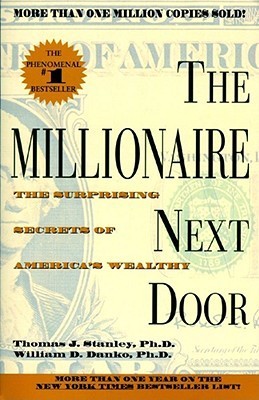The Millionaire Next Door Book Summary
The Surprising Secrets of America's Wealthy
TL;DR
'The Millionaire Next Door' reveals the surprising habits and lifestyles of America's wealthy, emphasizing financial discipline and frugality as key to accumulating wealth.
What is The Millionaire Next Door about
'The Millionaire Next Door' by Thomas J. Stanley and William D. Danko offers a profound exploration into the reality of wealth accumulation in America. Through extensive research and surveys, the authors uncover that most millionaires are not the flashy spenders often depicted in media, but rather individuals who embrace frugality, save diligently, and invest wisely. The book challenges conventional stereotypes about the rich, providing insights into their daily habits, financial strategies, and the importance of living below one’s means. The authors argue that understanding these traits is essential for anyone aspiring to achieve financial success.
The Millionaire Next Door 7 Key Takeaways
Frugality is Key
Self-made millionaires prioritize saving and investing over extravagant spending. Many live in modest homes and drive less expensive vehicles, illustrating that wealth doesn't require a lavish lifestyle.
The Importance of Financial Discipline
Successful millionaires consistently practice financial discipline, budgeting their expenses carefully. They focus on long-term wealth accumulation rather than immediate gratification through spending.
Investing Wisely
Accruing wealth involves not just earning a high income but also making informed investment choices. Millionaires often have diversified portfolios and take calculated risks.
Education and Career Choice
A strong education and strategic career choices play significant roles in wealth accumulation. Many millionaires choose professions that align with their financial goals.
Living Below Your Means
The authors emphasize that many millionaires live well below their means, avoiding credit card debt and unnecessary expenses, which allows them to save more effectively.
Avoiding Status Symbols
Wealthy individuals often shun status symbols, such as luxury cars and expensive homes, choosing instead to invest their money, which further facilitates wealth growth.
The Millionaire Formula
The book provides a formula to calculate expected net worth based on age and income, emphasizing that financial success is achievable with careful planning.
Top The Millionaire Next Door Quotes
- "Wealth is not determined by what you earn, but by what you save and invest."
- "The truly wealthy are those who live below their means and invest wisely."
- "Financial independence is more about discipline than about high income."
Who should read The Millionaire Next Door?
This book is ideal for individuals interested in improving their financial literacy and understanding the real behaviors that lead to wealth. Readers will find practical advice and insights that can inspire them to take control of their finances and work towards becoming millionaires themselves.
The Millionaire Next Door Best Reviews
- "A groundbreaking look at the hidden habits of America's wealthy, bursting many myths about wealth accumulation.'" - The New York Times
- "Stanley and Danko's research offers profound insights into financial success that everyone can apply to their lives." - Forbes
- "An essential read for anyone aiming to improve their financial literacy and achieve true wealth." - Business Insider
People also liked these summaries
The Millionaire Next Door FAQs
What are the 7 habits of The Millionaire Next Door?
The seven habits include being frugal, living below one’s means, investing wisely, maintaining financial discipline, choosing the right career, avoiding status symbols, and having a high income.
What is the main theme of The Millionaire Next Door?
The main theme revolves around the idea that real wealth is built through financial discipline, wise investments, and a frugal lifestyle, rather than through high income or flashy spending.
How can I calculate my expected net worth according to the book?
To calculate your expected net worth, multiply your age by your annual pretax income and divide by ten, adjusting for any inherited wealth.


